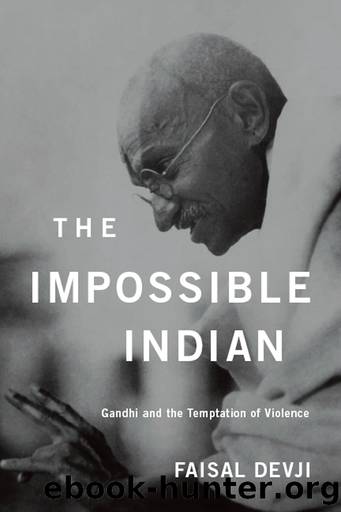Impossible Indian : Gandhi and the Temptation of Violence (9780674070639) by Devji Faisal

Author:Devji, Faisal [Devji, Faisal]
Language: eng
Format: epub
Publisher: Harvard Univ Pr
Published: 2012-08-14T16:00:00+00:00
Virtue out of necessity
The setting for Gandhi’s exploration of moral action was Arjuna’s celebrated dilemma on the battlefield of Kurukshetra. Arjuna’s dilemma, according to the Mahatma, was not whether he should or should not kill his relatives, but how any choice he might make in the circumstances would be at all meaningful morally. After all, whether he killed or did not, a slaughter would in any case ensue, and one in which he was fully implicated. How, then, could Arjuna either claim or avoid responsibility by any choice he might make? Or as Gandhi puts it:
Let us suppose that Arjuna flees the battlefield. Though his enemies are wicked people, are sinners, they are his relations and he cannot bring himself to kill them. If he leaves the field, what would happen to those vast numbers on his side? If Arjuna went away, leaving them behind, would the Kauravas have mercy on them? If he left the battle, the Pandava army would be simply annihilated. What, then, would be the plight of their wives and children? [. . .] If Arjuna had left the battlefield, the very calamities which he feared would have befallen them. Their families would have been ruined, and the traditional dharma of these families and the race would have been destroyed. Arjuna, therefore, had no choice but to fight.22
The question here is therefore the opposite of that normally asked in discussions of ethics: not how one should exercise choice, but how an act might retain moral meaning in a situation where choice itself has become superfluous. And choice becomes superfluous only in a world where every act includes what it intends as well as its opposite, thus giving rise to violence. Such a totality could be addressed neither by a calculus of means and ends nor by the arbitrariness of conscience, but instead, Gandhi thought, by action that abandoned choice altogether, which was after all meaningless if it could not determine the future. For only action that gave up the myth of control or effect might occur within a universe of determinations without itself falling prey to the sublime character of its totality.
Starting with the criticism that moral choice was delusionary and self-indulgent, Gandhi went on to reject its unacknowledged politics, by which such choice was held to determine the future and so retrospectively justify itself, just as ends are said to justify means. But how was choice or will to be eliminated from moral behavior? For one thing by rejecting the quest for self-realization upon which it was so often predicated in an ostentatious disavowal of crass instrumentality. Though a votary of self-realization at other times, the Mahatma was deeply suspicious of its narcissistic potential in his commentary on the Gita, because he thought that such a concern deprived action of its gravity by turning it into one among many options in an endless quest for fulfillment. Self-realization as a spiritual activity should therefore be replaced by self-purification as a bodily one:
We discussed yesterday that we should speak not of “self-realization” but of “self-purification”.
Download
This site does not store any files on its server. We only index and link to content provided by other sites. Please contact the content providers to delete copyright contents if any and email us, we'll remove relevant links or contents immediately.
| Africa | Americas |
| Arctic & Antarctica | Asia |
| Australia & Oceania | Europe |
| Middle East | Russia |
| United States | World |
| Ancient Civilizations | Military |
| Historical Study & Educational Resources |
The Story of China by Michael Wood(952)
Mr. Selden's Map of China by Timothy Brook(810)
Philippines--Culture Smart! by Culture Smart!(711)
Heroic Hindu Resistance To Muslim Invaders (636 AD to 1206 AD) by Sita Ram Goel(689)
Akbar: The Great Mughal by Ira Mukhoty(672)
Vedic Physics: Scientific Origin of Hinduism by Raja Ram Mohan Roy(663)
The Meaning of India by Raja Rao(662)
Food of India by unknow(661)
First Platoon by Annie Jacobsen(660)
Banaras by Diana L. Eck(648)
India--Culture Smart! by Becky Stephen(628)
China Unbound by Joanna Chiu(628)
North of South by Shiva Naipaul(626)
Mao's Great Famine: The History of China's Most Devastating Catastrophe, 1958-1962 by Frank Dikötter(608)
Insurgency and Counterinsurgency by Jeremy Black(595)
The Genius of China: 3,000 Years of Science, Discovery, and Invention by Robert Temple(592)
How to Be a Modern Samurai by Antony Cummins(584)
A History of Japan by R.H.P. Mason & J.G. Caiger(582)
The Digital Silk Road by Jonathan E. Hillman(580)
